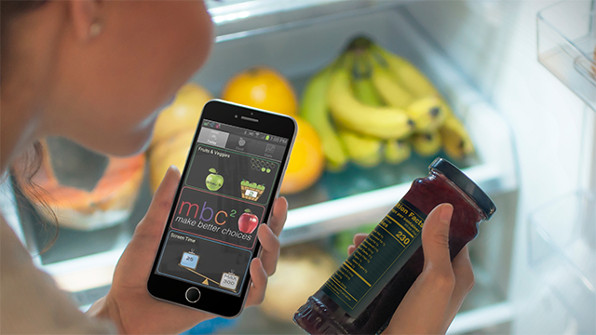If you’ve used your smart phone to monitor your exercise activities or set reminders for yourself, you already know how powerful a tool it can be and how much easier it can make your daily routine. Now, there’s an app that monitors your main heart and cancer risk factors…
 A study participant checks out the nutrient profile of a food item at her local supermarket,
A study participant checks out the nutrient profile of a food item at her local supermarket,
using the Make Better Choices 2 smart phone app.
Researchers at Northwestern University have created a smart phone app that keeps track of your main cardio fitness and cancer risk factors, in combination with an activity tracker, coaching and a modest financial incentive, just at the beginning.
The researchers at Northwestern say the four main health risk factors – too much screen time, too little exercise, high Fat intake and low Fruit and Vegetable intake – impact a number of conditions that plague us all in the western world.
Study participants made large improvements in their eating and activity habits. From a starting point of less than two servings of Fruits and Vegetables per day, they increased their intake by 6.5 servings per day. They decreased Saturated Fat intake by 3.6 percent to consume less than 8 percent of their calories from Saturated Sat. From a baseline of 4.5 hours per day of leisure screen time, they decreased screen time by almost three hours and increased their moderate to vigorous exercise by 25 minutes per day over a nine-month trial.
“Our findings suggest that prevention of chronic disease through behavior change is feasible. They contradict the pessimistic assumption that it’s not possible to motivate relatively healthy people to make large, long-lasting healthy lifestyle changes,” said Lead Author Bonnie Spring, Director of the Center for Behavior and Health in the Institute for Public Health and Medicine at Northwestern.
The really remarkable thing…
Study subjects participated in the guided, app-based program for nine months, but the financial incentives, which were only token amounts in the first place, were discontinued after three months. Nevertheless, Spring notes, the beneficial effects of the program continued after the incentives were discontinued, and participants were self-motivated to continue the new routine. That contradicts previous studies and common beliefs, that the beneficial effects of such programs are lost once the incentives are withdrawn. It appears, as of this writing, that the study participants made permanent changes for the better in their lifestyles as a result of the program.
Do we really need an app?
If common sense prevailed (as in, ‘if this was a perfect world’), we wouldn’t need smart phone apps to convince us to do the right thing – whether it be in reference to exercise, diet or whatever. I think it’s a key indicator about human nature, that Spring and her colleagues refer to the risk factors hey worked with as ‘bad habits’. That shows that the researchers concede that humans are only human; prone to procrastination, self-deception and other tactics to avoid doing the right thing – a thing that is usually more difficult or tiresome than the ‘bad habit’ alternative.
I’ll be the first to condemn myself for procrastination and taking the east way out. In fact, the new study slapped me in the face when it made me take a long, objective look at my current slack habits. I really have to pull up my socks and get more active. (Although, I do take two flights of stairs as many as 20 times a day, caring for m,y aged mother and doing the household chores.) On the diet side, I need to work more veggies back into my routine. Not that I don’t get lots of leafy greens, Onions, Mushrooms and Sweet Peppers; I just don’t get as much variety in my fruits and veggies as I probably should.
Anyway… You can find out more at the Northwestern Medicine website.
Now, get up from the screen and get moving!
~ Maggie J.
